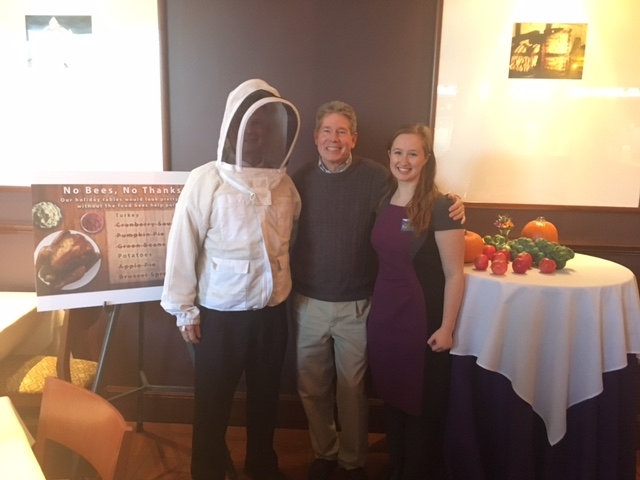Christy Leavitt
We don’t see many bees flying around Maryland at the end of November, but we do see the fruits of their labor. Pumpkin pie, cranberry sauce, green beans and more of the foods that make Thanksgiving dinner so special are possible through the work of bees. But bees are at risk. So this holiday season, chefs, beekeepers and environmental advocates are speaking out to protect bees and help stop them from dying off at alarming rates.
“We’re thankful for bees this Thanksgiving,” said Marion Kinosian, Environment Maryland Conservation Associate. “Without bees, Thanksgiving dinners in Maryland would look and taste different. No bees means no pumpkin pie.”
Honeybees, bumblebees, and other bees are critical both to the environment and our food supply. Bees pollinate many of the world’s most common crops, including Thanksgiving favorites such as cranberries, green beans, brussel sprouts and pie fillings from pumpkin to apple. Bees also pollinate coffee, chocolate and the alfalfa eaten by dairy cows.
“Reinvigorating our local food economy is tremendously important to me as a chef,” said Chef John Shields, of Gertrude’s restaurant. “And the overall health of our local agriculture is completely dependent upon the health of the bees and other pollinators. Without our pollinators—nothing will bear fruit, not our apples, our zucchini or even the alfalfa than is grown to feed our cows and other livestock.”
Unfortunately, millions of bees are dying across the U.S. every year. Beekeepers report they are losing an average of 30% of all honeybee colonies annually. Not only are honeybees are in danger; native bees, including bumblebees, are also at risk. The U.S. Fish and Wildlife Service added the first bee in the continental U.S., the rusty patched bumblebee, to the endangered species list earlier this year.
Scientists point to several reasons why bees are dying off, including global warming, habitat loss, parasites and a class of bee-killing pesticides known as neonicotinoids, or neonics.
Sharing some of the same chemical properties as nicotine, neonics are neurotoxins that can kill bees immediately and also can disorient bees, making it harder for them to pollinate plants and get back to their hives. Despite the fact that the science is clear on the dangers, neonic use has dramatically increased over the past decade. A recent study found that 86% of North American honey sampled contained neonics.
“There are many things that beekeepers are doing to keep our bees alive.” Explained Luke Goembel, a Maryland based beekeeper. “We fend off parasites, we provide them with food when nectar is scarce, and we give them inviting homes in which to thrive. However there is one threat to bees that we cannot control on our own: the extensive use of bee-harming pesticides. Science and our experience as beekeepers prove pesticides cannot be ignored as a threat to bees.”
In February, Environment Maryland joined with Environment America to launch the Bee Friendly Food Alliance, a national network of over 240 chefs, restaurant owners and other leaders in the food industry working to protect the bees. In Maryland, 11 restaurants & chefs are part of the Alliance, including Chef John Shields.
Together, chefs and restaurant owners are educating their customers and the public about the problems facing bees and making their voices heard to protect bees. Working with Environment Maryland, chefs and restaurant owners are calling on local and national decision makers to stop the use of bee killing pesticides.
“I’m looking forward to eating apple pie and ice cream next week,” said Kinosian. “We need to take action now to protect the bees and ensure we can enjoy our favorite foods with friends and family for many Thanksgivings to come.”

